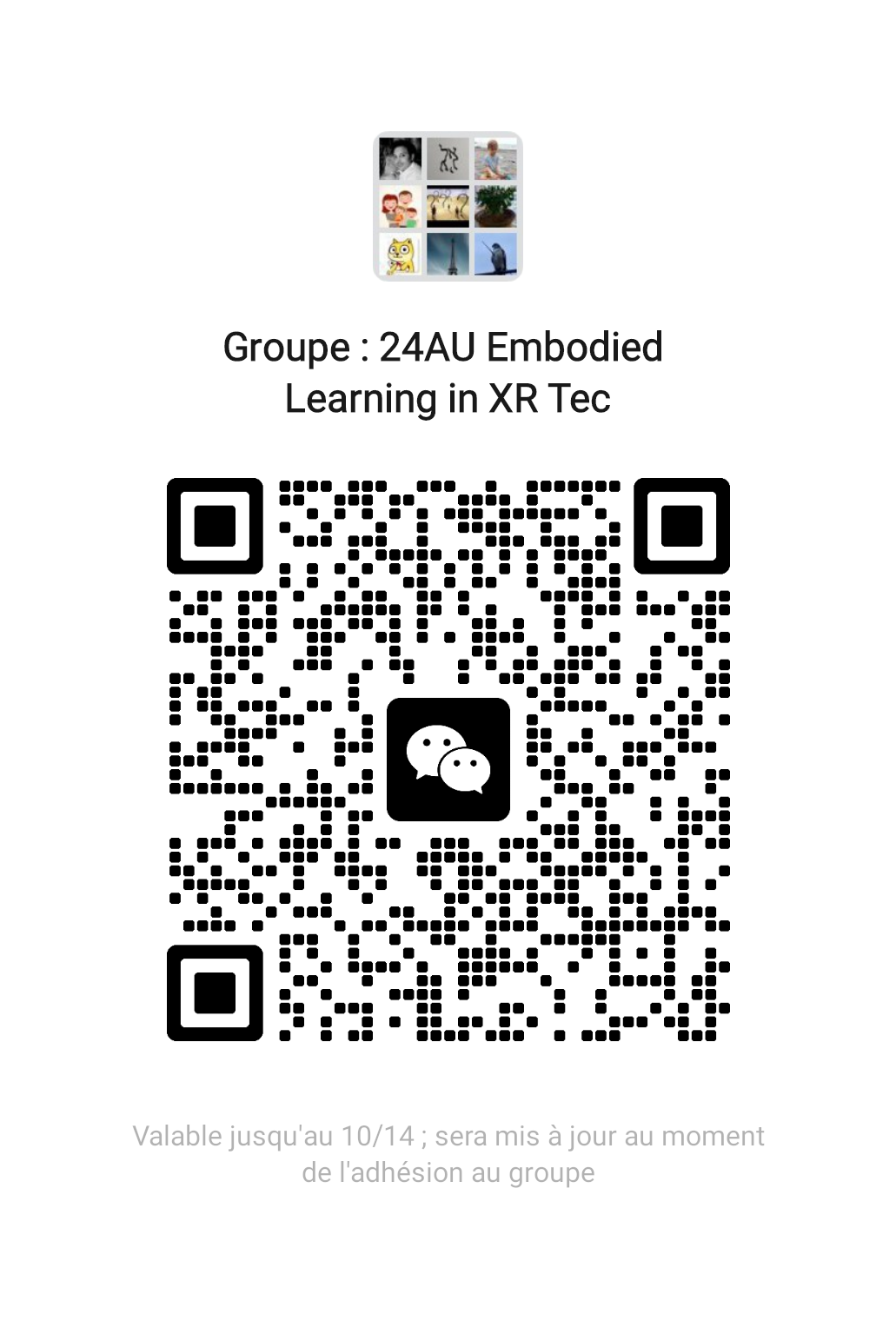Embodied Learning in XR Technologies applied to Mathematics
This course offers a comprehensive examination of the concept of embodiment, emphasizing its application within the domain of mathematics, particularly as it intersects with the rapidly evolving field of extended reality (XR) immersive environments.
Grounded in both philosophical and neuroscientific perspectives, the course investigates the intricate ways in which physical interaction with digital environments influences cognitive processes, specifically in the areas of learning and memory retention. By engaging with the theoretical underpinnings of embodiment, students will explore how embodied cognition contributes to mathematical reasoning and problem-solving. The curriculum is designed to bridge the gap between abstract mathematical concepts and tangible, immersive experiences, thereby providing students with a deeper understanding of how embodied practices can enhance cognitive performance in mathematical contexts. This course offers a comprehensive examination of the concept of embodiment, emphasizing its application within the domain of mathematics, particularly as it intersects with the rapidly evolving field of extended reality (XR) immersive environments. Grounded in both philosophical and neuroscientific perspectives, the course investigates the intricate ways in which physical interaction with digital environments influences cognitive processes, specifically in the areas of learning and memory retention. By engaging with the theoretical underpinnings of embodiment, students will explore how embodied cognition contributes to mathematical reasoning and problem-solving.
The curriculum is designed to bridge the gap between abstract mathematical concepts and tangible, immersive experiences, thereby providing students with a deeper understanding of how embodied practices can enhance cognitive performance in mathematical contexts.
The course structure integrates the study of the sensory-motor systems that underlie embodied experiences, drawing on empirical studies that link bodily states to cognitive processes. Through a detailed exploration of case studies and theoretical models, students will gain insights into how physical engagement within XR environments can facilitate a more intuitive grasp of complex mathematical ideas. The course also critically examines the role of serious games digital environments designed for educational purposes in fostering enhanced learning outcomes. These serious games, which are increasingly employed in educational settings, offer a unique platform for examining the efficacy of embodied learning strategies in promoting sustained cognitive engagement and improved educational performance.
Grounded in both philosophical and neuroscientific perspectives, the course investigates the intricate ways in which physical interaction with digital environments influences cognitive processes, specifically in the areas of learning and memory retention. By engaging with the theoretical underpinnings of embodiment, students will explore how embodied cognition contributes to mathematical reasoning and problem-solving. The curriculum is designed to bridge the gap between abstract mathematical concepts and tangible, immersive experiences, thereby providing students with a deeper understanding of how embodied practices can enhance cognitive performance in mathematical contexts. This course offers a comprehensive examination of the concept of embodiment, emphasizing its application within the domain of mathematics, particularly as it intersects with the rapidly evolving field of extended reality (XR) immersive environments. Grounded in both philosophical and neuroscientific perspectives, the course investigates the intricate ways in which physical interaction with digital environments influences cognitive processes, specifically in the areas of learning and memory retention. By engaging with the theoretical underpinnings of embodiment, students will explore how embodied cognition contributes to mathematical reasoning and problem-solving.
The curriculum is designed to bridge the gap between abstract mathematical concepts and tangible, immersive experiences, thereby providing students with a deeper understanding of how embodied practices can enhance cognitive performance in mathematical contexts.
The course structure integrates the study of the sensory-motor systems that underlie embodied experiences, drawing on empirical studies that link bodily states to cognitive processes. Through a detailed exploration of case studies and theoretical models, students will gain insights into how physical engagement within XR environments can facilitate a more intuitive grasp of complex mathematical ideas. The course also critically examines the role of serious games digital environments designed for educational purposes in fostering enhanced learning outcomes. These serious games, which are increasingly employed in educational settings, offer a unique platform for examining the efficacy of embodied learning strategies in promoting sustained cognitive engagement and improved educational performance.

讲师
艾内尔·勒纳
日期
2024年10月08日 至 12月25日
位置
| Weekday | Time | Venue | Online | ID | Password |
|---|---|---|---|---|---|
| 周二,周三 | 09:50 - 11:25 | Online | ZOOM A | 388 528 9728 | BIMSA |
课程大纲
Course Structure:
Chapter 1: Introduction to Embodiment
Chapter 2: Memory Retention and Embodiment
Chapter 3: Embodiment in Mathematics
Chapter 4: Applications of Embodiment in Geometry and XR Technologies
Chapter 5: Avatars in Virtual Environments
Chapter 6: Serious Games and Their Role in Education
Chapter 1: Introduction to Embodiment
Chapter 2: Memory Retention and Embodiment
Chapter 3: Embodiment in Mathematics
Chapter 4: Applications of Embodiment in Geometry and XR Technologies
Chapter 5: Avatars in Virtual Environments
Chapter 6: Serious Games and Their Role in Education
听众
Undergraduate
, Advanced Undergraduate
, Graduate
, 博士后
, Researcher
视频公开
公开
笔记公开
公开
语言
英文
讲师介绍
France-Ainel Lerner obtained her Ph.D. in Art and Science from the University of Liège, under the supervision of Steven Laureys and Mylène Botbol-Baum. She was a postdoctoral fellow at the Weizmann Institute of Science and joined BIMSA as an assistant professor in 2023. Her research spans affective neuroscience, digital interactive communication, and extended reality technologies. Her recent work focuses on critical states of consciousness, virtual embodiment, and interactive visual scientific representations.
In addition to her academic career, France-Ainel is an accomplished artist, with exhibitions spanning Europe and the Middle East. Her works explore the complex relationships between consciousness, time, and space, often through the lens of her scientific inquiries.
In addition to her academic career, France-Ainel is an accomplished artist, with exhibitions spanning Europe and the Middle East. Her works explore the complex relationships between consciousness, time, and space, often through the lens of her scientific inquiries.





